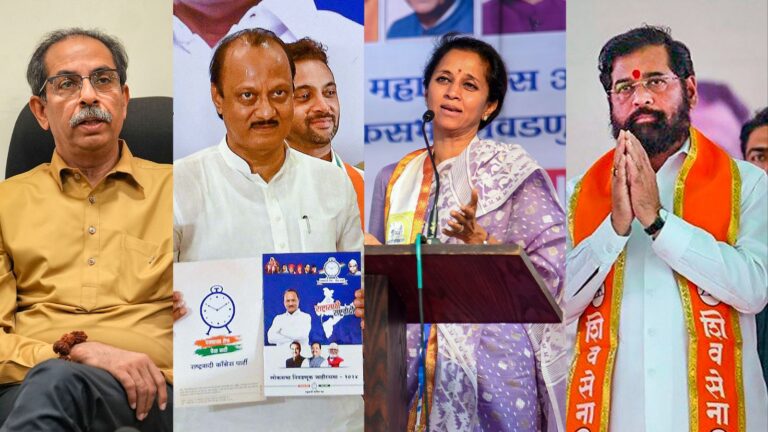After voting was held in five constituencies on April 19, Maharashtra will also vote in some parts in the next four phases of Lok Sabha polls from April 26 to May 20. . Votes will be counted on June 4th.
This will be the first election in Maharashtra after the split between the Shiv Sena and the Nationalist Congress Party. Let’s take a look at the key points from the major political parties’ manifestos.
NCP(SP)
The Congress Party (Sharachandra Pawar) manifesto supports a caste census and promises a separate commission for farmers’ welfare, apprenticeship rights and 50 per cent employment for women.
As per the manifesto titled ‘Shapatnama’, NCP (SP) reviews and proposes changes to Citizenship (Amendment) Act (CAA), National Register of Citizens (NRC), Unlawful Activities (Prevention) Act (UAPA) intend to do something. Other laws that are “inconsistent” with constitutional principles. Sharad Pawar’s party said it supports full statehood for Jammu and Kashmir and rejects the idea of ”one country, one election”.
The manifesto also supports scrapping the Agnipath scheme, women’s safety audits and strengthening cyber laws related to women. The party said it advocates empowering state and local governments, reshaping the distribution of power and implementing constitutional reforms.

The manifesto outlined the party’s foreign policy related to strategic global diplomacy, promoted partnerships that resonate with India’s role on the world stage, and highlighted the party’s views on national and internal security.
NCP
Nationalist Congress Party (NCP) leader Ajit Pawar has released his party’s manifesto for the Lok Sabha elections, stressing that it supports the demand for a caste-based census, which has been shunned by its ally the BJP.
The NCP will also demand the award of the country’s highest civilian award, the Bharat Ratna, to the late Yashvantrao Chawan, former chief minister and defense minister of Maharashtra.
He said other demands of the party include giving semi-English status to Urdu medium schools in the state and setting minimum support price (MSP) for agricultural produce.
Shiv Sena (UBT)
The Shiv Sena (UBT) manifesto focuses on job creation, farm loan waivers and stopping the ‘looting’ of Maharashtra. Party president Uddhav Thackeray said the financial city, which he claimed has been “moved to Gujarat”, would be built in Maharashtra and provide employment opportunities in the state.
Thackeray said that through the Union Government of India, not only will agricultural loans be waived off, but the terms and conditions related to crop insurance will also be revised. He said farm equipment and seeds will be exempted from GST (Goods and Services Tax). He also assured implementation of MSP as recommended by the Swaminathan Committee report.
Vanchit Bahujan Aghadi
Vanchit Bahujan Aghadi (VBA) leader Prakash Ambedkar has said that if voted to power, his party will take a strategic decision not to let contract workers retire until the age of 58 and pass laws on minimum selling prices for farmers. He said that he would enact it.
The party will ensure free education from kindergarten to PG classes, it added, adding that 9% of the funds will be earmarked for education.
B.B.T.
The Bharatiya Janata Party in Maharashtra has not released a manifesto for the state and is campaigning on the ‘Sankalp Patra’ promise announced by Prime Minister Narendra Modi on April 14. The manifesto included India’s bid for the 2036 Olympics and the implementation of the National Education Policy (NEP). ), laws against paper leaks, and other commitments. Read the main highlights of Sankalp Patra here
meeting
The Maharashtra Legislative Assembly is following in the footsteps of the national unit.Nyai PatraIt is based on five “pillars of righteousness” (Yuva Nyai, Nari Nyai, Kisan Nyai, Shramik Nyai, Hisedari Nyai) and contains 25 guarantees under them.
Passage of constitutional amendments to increase the right of apprenticeship, legal guarantee for MSP and 50 per cent cap on reservation for SCs, STs and OBCs are among the promises made by the Congress in its poll manifesto.
With input from PTI

